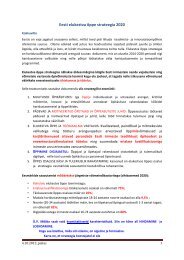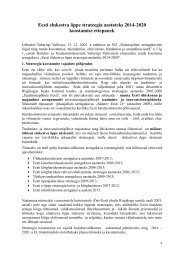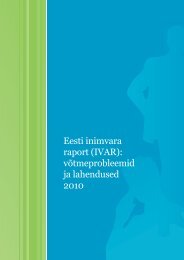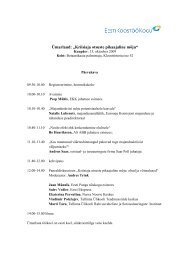DEVELOPMENT
The pdf-version - Eesti Koostöö Kogu
The pdf-version - Eesti Koostöö Kogu
You also want an ePaper? Increase the reach of your titles
YUMPU automatically turns print PDFs into web optimized ePapers that Google loves.
2.8<br />
Public assessments of the state’s development<br />
and trust in government institutions<br />
Juhan Kivirähk, Marju Lauristin<br />
The basis of representative democracy is trust. Ordinary<br />
citizens do not have to, or even wish to, deal with problems<br />
related to the functioning of the state on an everyday<br />
basis – they delegate the representation of their interests<br />
to representative political bodies. Although the activities<br />
of states’ governments are assessed on the basis of various<br />
indicators (including democracy indices), one of the main<br />
components of good governance is the existence of a bond<br />
of trust with the citizens.<br />
Of course, trust can also exist without the involvement<br />
of the citizens and without providing them with the<br />
opportunity to participate – this depends on the political<br />
culture of the specific country, the citizenry’s levels of<br />
education, organisation and readiness to participate in<br />
the development of the society. Today, the majority of<br />
democratic societies have reached a stage of development<br />
where information technology provides the citizens with<br />
the opportunity to stay updated on what’s going on in<br />
the country and to express their opinions. The society<br />
members’ levels of information and awareness have grown<br />
significantly; and the need and wish to participate in the<br />
state’s development has increased. If governments do not<br />
make a sufficient effort to involve the citizenry in policymaking,<br />
and do not take their opinions into consideration,<br />
this can lead to a protest mentality, and a declining<br />
of trust in state authority. Of course, the situation is exacerbated<br />
by the fact that people’s socio-economic wellbeing<br />
worsens when uncertainty deepens about whether the<br />
bodies of power can cope with their assignments. If, in<br />
this situation, the bodies of power have an understanding<br />
of democracy that is limited to obtaining an authorisation<br />
of power, and feedback (reporting to, and communications<br />
with, the electorate) is reduced to only regular elections,<br />
political trust will start to erode.<br />
2.8.1<br />
Trust in state governance in Estonia and<br />
other European states<br />
The trust in state institutions among the citizens of the<br />
European Union Member States is regularly examined by<br />
the Eurobarometer.<br />
The level of satisfaction with the state’s general developmental<br />
trends is low in almost all of the EU states (slightly<br />
positive assessments can be found only Austria and Denmark);<br />
however, in Finland, the Netherlands, Austria and<br />
Denmark, trust in the state’s leading political institutions<br />
is significantly higher than in the other states under observation.<br />
It is noteworthy that the institutions that are closer<br />
to the citizenry, with which a personal contact exists (local<br />
bodies of power), are trusted more in all the states.<br />
Figure 2.8.1<br />
Trust in institutions, autumn 2012<br />
Government Parliament Local government<br />
Percentage<br />
Finland<br />
Austria<br />
Netherlands<br />
Denmark<br />
Estonia<br />
Slovakia<br />
Hungary<br />
Lithuania<br />
Ireland<br />
Latvia<br />
Slovenia<br />
Czech Rep.<br />
0 10 20 30 40 50 60 70<br />
Percentage 0 10 20 30 40 50 60 70<br />
Source: Eurobarometer 78<br />
When comparing the old and new democracies<br />
(Figure 2.8.1.), we notice different patterns of trust, as<br />
well as various levels of trust. In the Nordic countries,<br />
with their strong democratic traditions, as well as in<br />
Austria and the Netherlands, trust in the parliament is<br />
higher than in the government, and there is no sharp<br />
difference between the trust in power at the national and<br />
local levels. At the same time, in Estonia, as in the other<br />
post-Communist countries, as a rule, trust in the local<br />
governments is much greater than in the institutions at<br />
the national level, whereas, there is more trust in the<br />
govern ment than in the parliament.<br />
If, in Finland and Denmark, over 60% of the respondents<br />
trust the parliament, in Estonia, only a third of the<br />
Estonian Human Development Report 2012/2013<br />
95















